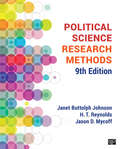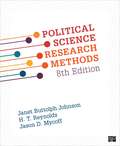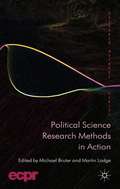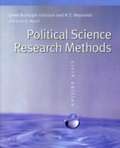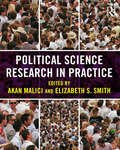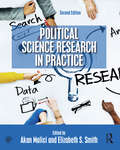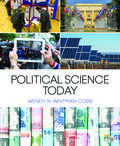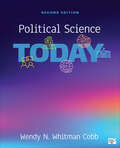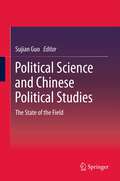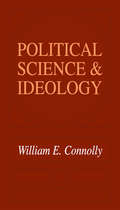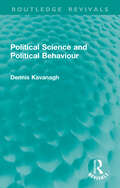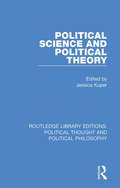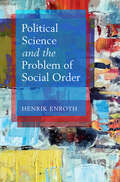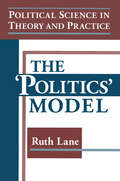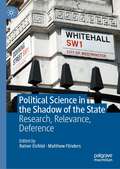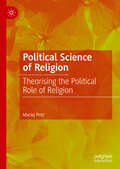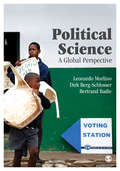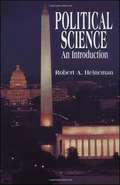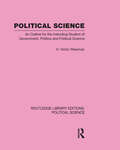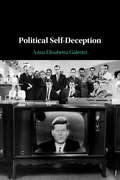- Table View
- List View
Political Science Research Methods
by Jason D. Mycoff Janet B. Johnson Dr. H. () ReynoldsUnderstand the “how” and the “why” behind research in political science. Political Science Research Methods by Janet Buttolph Johnson, H. T. Reynolds, and Jason D. Mycoff helps you to understand the logic behind research design by guiding you through a step-by-step process that explains when and why a researcher would pursue different kinds of methods. The highly anticipated Ninth Edition of this trusted resource provides more international examples, an increased focus on the role ethics play in the research process, increased attention to qualitative research methods, and expanded coverage on the role of the internet in research and analysis.
Political Science Research Methods
by Janet Buttolph Johnson Jason D. MycoffThe Eighth Edition of this trusted resource offers a greater emphasis on the ways in which particular methods are used by undergraduates, expanded coverage of the role of the Internet in research and analysis, and more international examples.
Political Science Research Methods in Action
by Michael Bruter Martin LodgeThrough accounts from innovative research projects by world-leading political scientists, this volume offers a unique perspective on research methodology. It discusses the practical and intellectual dilemmas researchers face throughout the research process in a wide range of fields from implicit attitude testing to media analysis and interviews.
Political Science Research Methods, 6th Ed.
by Janet Buttolph Johnson H. T. Reynolds Jason D. MycoffDon't let an introduction to research methods be your students' least favorite (and most intimidating) political science course. Relevant, timely, insightful, comprehensive, and always mindful of their student audience, the authors have revamped their popular text so that the sixth edition is friendlier and more intuitive than ever--the perfect gateway to understanding not just the "how" but also the "why" behind research into politics. Covering the discipline's major methods, the authors lead students step-by-step through the logic of research design. "Building block" chapters on hypothesis formation and testing, variables, and measurement are right up front; the introduction to research design, sampling, and literature reviews now come with more explanation as to why a researcher would pursue different kinds of methods; the stats chapters begin with a common-sense primer that walks students through foundational ideas and practices. Throughout the text, updated examples of contemporary research problems keep readers engaged. Each chapter has bolded key terms that are also listed in a glossary at the end of each chapter and the end of the text. "Helpful hints" feature boxes give students nuts-and-bolts reminders they can refer to when they conduct their own research or assess the work of others. NEW TO THIS EDITION New examples of political science research in Chapter 1, including a case on judicial decision making and current research into public opinion on the war in Iraq. Expanded discussion of theory in Chapter 2, showing how competing paradigms can be applied to the same topic of study. Substantially updated discussion of survey research including coverage of Internet polling and a fuller description of interviewing. Computational formulas and calculations are now featured in "How It's Done" boxes allowing students to separate lengthy calculations from substantive discussion of the meaning or interpretation of statistical results. Greater coverage of newer developments in applied statistics, including exploratory data analysis and descriptive and inferential statistics for counts and functions of counts. In general, less emphasis on computation, and more on interpretation. Reorganized statistics chapters for better comprehension with regression analysis and logistic regression in their own chapters. A new overview of statistical analysis, including discussion of data preparation, description, modeling, inference, interpretation, and the communication of results.
Political Science Research in Practice
by Akan Malici Elizabeth S. SmithNothing rings truer to those teaching political science research methods: students hate taking this course. Tackle the challenge and turn the standard research methods teaching model on its head with Political Science Research in Practice. Akan Malici and Elizabeth Smith engage students first with pressing political questions and then demonstrate how a researcher has gone about answering them, walking through real political science research that contributors have conducted. Through the exemplary use of survey research, experiments, field research, case studies, content analysis, interviews, document analysis, statistical research, and formal modeling, each chapter introduces students to a method of empirical inquiry through a specific topic that will spark their interest and curiosity. Each chapter shows the process of developing a research question, how and why a particular method was used, and the rewards and challenges discovered along the way. Students can better appreciate why we need a science of politics--why methods matter--with these first-hand, issue-based discussions. The following features make this an ideal teaching tool: An introductory chapter that succinctly introduces key terms in research methodology Key terms bolded throughout and defined in a glossary Broad coverage of the most important methods used in political science research and the major subfields of the discipline A companion website designed to foster online active learning An instructor's manual and testbank to help incorporate this innovative text into your syllabus and assessment.
Political Science Research in Practice
by Akan Malici Elizabeth S. SmithNothing rings truer to those teaching political science research methods: students hate taking this course. Tackle the challenge and turn the standard research methods teaching model on its head with Political Science Research in Practice. Akan Malici and Elizabeth S. Smith engage students first with pressing political questions and then demonstrate how a researcher has gone about answering them, walking them through real political science research that contributors have conducted. Through the exemplary use of a comparative case study, field research, interviews, textual and interpretive research, statistical research, survey research, public policy and program evaluation, content analysis, and field experiments, each chapter introduces students to a method of empirical inquiry through a specific topic that will spark their interest and curiosity. Each chapter shows the process of developing a research question, how and why a particular method was used, and the rewards and challenges discovered along the way. Students can better appreciate why we need a science of politics—why methods matter—with these first-hand, issue-based discussions. The second edition now includes: Two completely new chapters on field experiments and a chapter on the textual/interpretative method. New topics, ranging from the Arab Spring to political torture to politically sensitive research in China to social networking and voter turnout. Revised and updated "Exercises and Discussion Questions" sections. Revised and updated "Interested to Know More" and "Recommended Resources" sections.
Political Science Today
by Wendy N. Whitman CobbPolitical science has changed; the way students learn has changed; so too should the way it’s taught. This is political science, today. Political Science Today by Wendy Whitman Cobb gives you a holistic view of the subfields that make up political science by dedicating one chapter to each of the topics at the core of the discipline. Unlike denser texts on the market, Political Science Today uses a field-based approach that allows you to engage with the material directly and dig into each of the discipline’s diverse subfields while also developing critical thinking skills, discerning the differences between politics and political science, conducting and consuming research, and broadening your future career aspirations. The book’s innovative table of contents begins with foundational tools like theories and research methods, then builds up to subfield chapters on Comparative Politics, International Relations, American Government, Political Economy, and Public Policy and Administration. Current case studies throughout the text provide a backdrop for engaging classroom discussions on topics such as President Trump’s travel ban, ISIS as a state, and strengths and weaknesses of the United Nations. This unique approach provides short segments of topic coverage, plenty of summarizing content and review questions, as well as comprehensive learning objectives which will help you understand the realities of political science today.
Political Science Today
by Wendy N. Whitman CobbPolitical science has changed; the way students learn has changed; so too should the way it’s taught. This is political science, today. Political Science Today by Wendy Whitman Cobb gives you a holistic view of the subfields that make up political science by dedicating one chapter to each of the topics at the core of the discipline. Unlike denser texts on the market, Political Science Today uses a field-based approach that allows you to engage with the material directly and dig into each of the discipline’s diverse subfields while also developing critical thinking skills, discerning the differences between politics and political science, conducting and consuming research, and broadening your future career aspirations. The book’s innovative table of contents begins with foundational tools like theories and research methods, then builds up to subfield chapters on Comparative Politics, International Relations, American Government, Political Economy, and Public Policy and Administration. Current case studies throughout the text provide a backdrop for engaging classroom discussions on topics such as President Trump’s travel ban, ISIS as a state, and strengths and weaknesses of the United Nations. This unique approach provides short segments of topic coverage, plenty of summarizing content and review questions, as well as comprehensive learning objectives which will help you understand the realities of political science today.
Political Science Today
by Wendy N. Whitman CobbPolitical Science Today by Wendy Whitman Cobb gives students a holistic view of political science by dedicating one chapter to each area of study within the discipline. The Second Edition uses a field-based approach that allows students to sample what the major has to offer and come away with a basic understanding of how politics—any kind of politics—affects their everyday lives. The book also provides students with an overview of the skills and possibilities they′ll encounter as majors, including developing critical thinking skills, conducting and consuming research, and understanding the unique career opportunities after graduation. The book′s table of contents begins with foundational tools like theories and research methods, then builds up to subfield chapters on Comparative Politics, International Relations, American Government, Political Economy, and Public Policy and Administration. This title is accompanied by a complete teaching and learning package. Contact your Sage representative to request a demo. Learning Platform / Courseware Sage Vantage is an intuitive learning platform that integrates quality Sage textbook content with assignable multimedia activities and auto-graded assessments to drive student engagement and ensure accountability. Unparalleled in its ease of use and built for dynamic teaching and learning, Vantage offers customizable LMS integration and best-in-class support. It′s a learning platform you, and your students, will actually love. Learn more. Assignable Video with Assessment Assignable video (available in Sage Vantage) is tied to learning objectives and curated exclusively for this text to bring concepts to life. Watch a sample video now. LMS Cartridge: Import this title’s instructor resources into your school’s learning management system (LMS) and save time. Don’t use an LMS? You can still access all of the same online resources for this title via the password-protected Instructor Resource Site. Learn more.
Political Science Today
by Wendy N. Whitman CobbPolitical Science Today by Wendy Whitman Cobb gives students a holistic view of political science by dedicating one chapter to each area of study within the discipline. The Second Edition uses a field-based approach that allows students to sample what the major has to offer and come away with a basic understanding of how politics—any kind of politics—affects their everyday lives. The book also provides students with an overview of the skills and possibilities they′ll encounter as majors, including developing critical thinking skills, conducting and consuming research, and understanding the unique career opportunities after graduation. The book′s table of contents begins with foundational tools like theories and research methods, then builds up to subfield chapters on Comparative Politics, International Relations, American Government, Political Economy, and Public Policy and Administration. This title is accompanied by a complete teaching and learning package. Contact your Sage representative to request a demo. Learning Platform / Courseware Sage Vantage is an intuitive learning platform that integrates quality Sage textbook content with assignable multimedia activities and auto-graded assessments to drive student engagement and ensure accountability. Unparalleled in its ease of use and built for dynamic teaching and learning, Vantage offers customizable LMS integration and best-in-class support. It′s a learning platform you, and your students, will actually love. Learn more. Assignable Video with Assessment Assignable video (available in Sage Vantage) is tied to learning objectives and curated exclusively for this text to bring concepts to life. Watch a sample video now. LMS Cartridge: Import this title’s instructor resources into your school’s learning management system (LMS) and save time. Don’t use an LMS? You can still access all of the same online resources for this title via the password-protected Instructor Resource Site. Learn more.
Political Science and Chinese Political Studies
by Sujian GuoWe have witnessed the substantial transformation of China studies, particularly Chinese political studies, in the past 30 years due to changes in China and its rising status in the world as well as changes in our ways of conducting research. As area studies specialists, we are no longer "isolated" from the larger disciplines of Political Science and International Relations (IR) but an integral part of them. This book contains theoretically innovative contributions by distinguished political scientists from inside and outside China, who together offer up-to-date overviews of the state of the field of Chinese political studies, combines empirical and normative researches as well as theoretical exploration and case studies, explore the relationship between Western political science scholarship and contemporary Chinese political studies, examine the logic and methods of political science and their scholarly application and most recent developments in the study of Chinese politics, and discuss the hotly-contested and debated issues in Chinese political studies, such as universality and particularity, regularity and diversity, scientification and indigenization, main problems, challenges, opportunities and directions for the disciplinary and intellectual development of Chinese political studies in the context of rising China.
Political Science and Ideology
by William ConnollyProfessor David Kettler commented at the time of initial release, that this book is "writing with great poise and clarity, the author says important things in a deceptively simple way about a problem of paramount significance. A fine piece of clarification, blending just the right mixture of respect and impiety toward the important heroes of contemporary political science, this is the kind of book I look forward to having available for our courses in political theory."Ideology, though long pronounced moribund, continues to play a central role in contemporary political inquiry. In this reevaluation of the true function of political science, the author lays down guidelines for the construction of fruitful political interpretations in the large areas where ideological assumptions and claims cannot be adequately tested. He analyzes two representative theories of power in American society-those of the "pluralists" who affirm and the "elitists" who dispute the case for democracy-and demonstrates how personal preferences and group-oriented interests enter into the development of these concepts. Speaking to all social scientists and students engaged in the study of political processes, Connolly details the methods by which the investigator-who inevitably brings his own beliefs and values to the task-can lay bare and control the ideological aspects of his own work and that of others.A critical examination of the writings of some of the leading figures in recent and contemporary political inquiry, such as Karl Mannheim, C. Wright Mills, Robert Dahl, Daniel Bell, and Seymour Martin Lipset leads him to assign a decisive role for the political scientist in the creation of carefully formulated ideologies. An original mind, drawing upon an exceptionally rich store of knowledge, has here produced an important book which will be of immediate-and challenging-relevance to the work and studies of all scholars, graduate students, and majors in the field
Political Science and Political Behaviour (Routledge Revivals)
by Dennis KavanaghOriginally published in 1983, this book locates the behavioural approach to the study of politics in its social science and historical context. The text reviews the findings in a number of fields – public opinion, electoral behaviour, political participation, policy outputs, political recruitment, political welfare and socialisation, among others. The book is comprehensive and when first published it was the first single-author study to integrate the diverse findings of many studies both from the UK and North America. It was particularly written for students on courses in political analysis, political methods, political sociology and political behaviour
Political Science and Political Theory (Routledge Library Editions: Political Thought and Political Philosophy #34)
by Jessica KuperFirst published in 1987. The key issues, concepts and figures relevant to the study of political science and theory today are covered in this volume, and useful suggestions for further reading are included. In political science, topics range from the analysis of voting to decision making; philosophical issues from anarchism through human rights to utopianism; and the biographies deal with major thinkers such as Arendt, Burke, Hobbes, Marx and Rousseau.
Political Science and the Problem of Social Order
by Henrik EnrothThe problem of social order is the question of what holds complex and diverse societies together. Today, this question has become increasingly urgent in the world. Yet our ability to ask and answer the question in a helpful way is constrained by the intellectual legacy through which the question has been handed down to us. In this impressive, erudite study, Henrik Enroth describes and analyzes how the problem of social order has shaped concept formation, theory, and normative arguments in political science. The book covers a broad range of influential thinkers and theories throughout the history of political science, from the early twentieth century onwards. Social order has long been a presupposition for inquiry in political science; now we face the challenge of turning it into an object of inquiry.
Political Science class 10 - Karnataka board: ರಾಜಕೀಯ ವಿಜ್ಞಾನ 10 ನೇ ತರಗತಿ - ಕರ್ನಾಟಕ ಮಂಡಳಿ
by Karnataka Patyapusthaka SanghaPolitical Science text book for 10th Standard kannada medium, karnataka state
Political Science class 11 - Tamil Nadu Board: அரசியல் அறிவியல் மேல்நிலை முதலாம் ஆண்டு
by State Council of Educational Research and Training Tamil Naduஇந்த புத்தகத்தில் நாம் அரசியல் அறிவியலின் அறிமுகம், அரசு, அரசியல் அறிவியலின் அடிப்படைக் கருத்தாக்கங்கள், மக்களாட்சி, அரசாங்கத்தின் வகைப்பாடுகள், அரசியல் சிந்தனை, அரசியல் கொள்கைகள், சமூக நீதி மற்றும் சில பாடங்கள் பற்றி காண்கிறோம்.
Political Science in Theory and Practice: The Politics Model
by Kris E LaneThis text demonstrates that there is a politics model that unifies the discipline and structures its relationship to the other social sciences. It shows how this model underlies important works of applied research in all the main political science subfields.
Political Science in the Shadow of the State: Research, Relevance, Deference
by Matthew Flinders Rainer EisfeldWhat is the link between scholarship and democracy? What role do academics play in sustaining democratic values? Why should concerns about the ‘hollowing-out’ of democracy include a focus on the changing governance of higher education? Offering the first comparative analysis of how both democratic and autocratic politicians are seeking to control the research funding landscape, this book reveals a very worrying shift in the relationships between the state and universities: With higher education politically redefined as a mere tool of economic strategy, the space for academic autonomy, intellectual independence and critical thinking is being closed down. This book will be of interest to anyone concerned about democratic governance and the future of higher education.
Political Science of Religion: Theorising the Political Role of Religion
by Maciej PotzThis book introduces political science of religion – a coherent approach to the study of the political role of religion grounded in political science. In this framework, religion is viewed as a political ideology providing legitimation for power and motivating political attitudes and behaviors of the public. Religious organizations are political actors negotiating the political system in the pursuit of their faith-based objectives. Religion is thus interpreted as a power resource and religious groups as political players. The theoretical framework developed in the first part is applied to the study of theocracies and contemporary democracies, based on the case studies of Poland and the USA. The empirical analysis of resources, strategies and opportunities of religious actors demonstrates their ability to influence the politics of democracies and non-democracies alike. Using a multilevel approach, the book seeks to explain this tremendous political potential of religion.
Political Science: A Global Perspective (The\world Of Political Science)
by Dirk Berg-Schlosser Bertrand Badie Leonardo A. MorlinoFrom the award-winning team behind the International Encyclopaedia of Political Science... Moving beyond mainstream "traditional" approaches to bring you a new advanced-level introduction to political science. A perfect introduction for postgraduates who are new to political science, as well as upper-level undergraduates looking to broaden and deepen their understanding of core topics, this progressive account: Guides you through all key areas of political science: origins, methodological foundations, key topics, and current issues Takes an international and pluralist perspective with all issues explored in a comparative way related to different cultural and historical contexts Includes pulled-out descriptions of major concepts, further reading and self-assessment questions at the end of each chapter.
Political Science: A Global Perspective (The\world Of Political Science)
by Dr Dirk Berg-Schlosser Professor Bertrand Badie Professor Leonardo A. MorlinoFrom the award-winning team behind the International Encyclopaedia of Political Science... Moving beyond mainstream “traditional” approaches to bring you a new advanced-level introduction to political science. A perfect introduction for postgraduates who are new to political science, as well as upper-level undergraduates looking to broaden and deepen their understanding of core topics, this progressive account: Guides you through all key areas of political science: origins, methodological foundations, key topics, and current issues Takes an international and pluralist perspective with all issues explored in a comparative way related to different cultural and historical contexts Includes pulled-out descriptions of major concepts, further reading and self-assessment questions at the end of each chapter.
Political Science: An Introduction
by Robert A. HeinemanIntroductory college textbook on political science
Political Science: An Outline For The Intending Student of Government, Politics and Political Science (Routledge Library Editions: Political Science #14)
by H. Victor WisemanThis book, originally published in 1959, makes explicit the social principles which underlie the procedures and political practice of the modern democratic state. The authors take the view that in the modern welfare state there are problems connected with the nature of law, with concepts like rights, justice, equality, property, punishment, responsibility and liberty and which modern philosophical techniques can illuminate.
Political Self-Deception
by Anna Elisabetta GaleottiSelf-deception, that is the distortion of reality against the available evidence and according to one's wishes, represents a distinctive component in the wide realm of political deception. It has received relatively little attention but is well worth examining for its explanatory and normative dimensions. In this book Elisabetta Galeotti shows how self-deception can explain political occurrences where public deception intertwines with political failure – from bad decisions based on false beliefs, through the self-serving nature of those beliefs, to the deception of the public as a by-product of a leader's self-deception. Her discussion uses close analysis of three well-known case studies: John F. Kennedy and the Cuba Crisis, Lyndon B. Johnson and the Gulf of Tonkin Resolution, and George W. Bush and the Weapons of Mass Destruction. Her book will appeal to a range of readers in political philosophy, political theory, and international relations.
